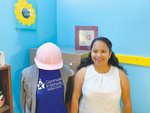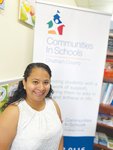

SILER CITY — Most kids dream of becoming astronauts or actors, but as an 8-year-old, Jazmin Mendoza Sosa dreamed of becoming a college graduate.
“I worked really hard for school,” she said. “I would tell (my dad) that I wanted to learn English, that I wanted to go to the U.S. one day, and I wanted to learn a new language.”
Twelve years later, she achieved her dream, but it wasn’t a smooth journey. As an undocumented first-generation college student — and now-DACA beneficiary — Mendoza Sosa struggled with others’ low expectations, little support and uncertainty, yet persevered through it all. And now she shares the lessons learned in that journey as a student support specialist at Virginia Cross Elementary through her work for Communities In Schools of Chatham County.
Born in Mexico State, Mendoza Sosa, 26, grew up in a small farm town in Veracruz. The town was “one single big road” surrounded by “farming and cattle,” she remembered, and it offered limited opportunities.
“We did have an elementary school in my town, but then if you wanted to go to the middle school, you would have to travel to another little town,” she said. “And if you wanted to go to the high school, you would have to travel even more.”
Beyond education, Mendoza Sosa said her town held limited career opportunities, too: most men became farmers and women grew up to be housewives. Even those who left to find more opportunities in the city would likely end up working as housekeepers or in retail.
“When I first left Mexico, they were like, ‘Oh, when she grows up, she’s just going to get married, have kids and be a housewife,’” she said. “And I’m like, ‘No, I’m not! I’m going to do much more.’”
When she was 8, Mendoza Sosa crossed the border with a relative and arrived in Siler City in 2003. Her family stayed behind at first.
“Traveling here was really hard,” she said. “We traveled in a van. It was super packed. I still remember not being able to really move, and the first thing I saw (after) the first time I was able to get up from like laying down on the van was Walmart in Siler City.”
Mendoza Sosa was enrolled in Siler City Elementary School, but she’d be bused to another school to learn English. The school paired her with another child who could interpret and translate for her, but she said that student didn’t always translate everything.
“So, I would not know what was happening at least 80% of the time. I would say it was hard because at home I didn’t have anybody to help me with school,” she said, adding, “And I just missed my parents, knowing that they were in another country and I didn’t know when I was going to see them again.”
Mendoza Sosa attended Chatham Middle School and Jordan-Matthews High School, where she said lack of guidance and support were some of her biggest challenges. In her first year, she recalled, nobody helped her choose classes or advised her on what to do. Her parents didn’t finish high school, she said, and worked hard to provide food on the table for her and her siblings.
“There was nobody that would help me (or) advocate for me,” she said, adding, “(My parents) would always expect me to do my best and expect me to do what I needed to do at that time. And being the oldest, I have to provide that example.”
More than that, she felt like some teachers had low expectations of her — even in college — which she said didn’t lead her to make the best decisions in that first year.
“I was the Latina immigrant woman who would just finish high school or would end up working in that poultry plant and would not be able to go to college,” she said. “I would be off track. I would be one of statistics with teen pregnancy or those statistics of high school dropouts.”
That’s why she said gaining a mentor made all the difference.
In her sophomore year, she was accepted into a mentoring program offered by UNC-Chapel Hill — then called the Scholars' Latino Initiative. Her mentor guided her to get involved in the community and to challenge herself by taking honors and AP classes.
“Without them, I felt like my journey to college and my journey to pursue higher education would have been harder, and it was already,” Mendoza Sosa said, “I had to go through a lot. I had to sacrifice a lot of my time with my friends (and) family.”
But even with such support, her immigration status complicated things — and still does. Until she was approved for DACA in 2013, she couldn’t legally drive or work.
“I didn’t start driving until maybe as an older teenager,” she said. “I was very scared to get stopped by the police.”
As a DACA beneficiary, she had to pay out-of-state tuition to attend Meredith College. Even now, she said maintaining her DACA status takes up time, requires a lot of money and perpetuates the uncertainty in which she’s lived most of her life.
“I have to (renew DACA) in a certain period of time because if I don’t get it before my other one expires, I could lose my job,” she said, “or I wouldn’t be able to drive.”
But these obstacles didn’t spin her off course. Mendoza Sosa graduated from Meredith College in 2015 — a semester early — with a bachelor’s degree in communication.
“(Graduating) was the best thing,” she said. “It meant I had accomplished a life goal. I was honoring my parents because they sacrificed a lot. I was proving that I can be more than (just) a statistic. I was being a role model to my siblings.”
And now, she’s determined to make sure other kids receive the educational support and resources she initially didn’t: in 2016, she became a student support specialist for Communities In Schools (CIS). CIS’ mission is to surround students with a network of support, empowering them to stay in school and achieve in life, and Mendoza Sosa works with K-5 kids and their families, where she’s found a niche.
“I always thought I was going to work with youths, like teenagers, high school students,” she said, but later added that she grew to love it.
Mendoza Sosa’s supervisor at CIS, Tych Cowdin, said it takes a unique level of passion, commitment and interpersonal skill to successfully navigate the role of a CIS student support specialist.
“It’s difficult to imagine someone who has accomplished more, and performed the role at a higher level than Jazmin Mendoza Sosa,” said Cowdin, who is CIS’ executive director.
From her first day at CIS, Cowdin said, Mendoza Sosa has used her passion and influence at Virginia Cross.
“She has been an integral part of the VCE community during this time — going above and beyond to connect school administration, community partners, students and their families to vital resources which have consistently generated meaningful outcomes,” he said. “Jazmin’s unique ability to reach families and maintain relationships has been extraordinary.”
Education is Mendoza Sosa’s passion. It provides so much more than the ability to read or write, she said; education provides the ability to make good decisions.
“Unfortunately, a lot of people haven’t been able to get that knowledge and that opportunity to learn,” she said. “And often decisions have been put on them just because they don’t know what to choose because they didn’t learn how to know how to have choices.”
Choices — that’s what she wants Siler City’s youth to have, and she hopes to provide kids all the necessary support and engagement they need. After all, she once was that shy kid “who could fall into the cracks” without anyone noticing.
“And that’s why I believe what I do,” Mendoza Sosa said. “I believe that I could have done much more growing up in middle school and high school if I had had somebody who was there for me.”
And what about Mendoza Sosa’s objective of doing “much more” with her life?
Cowdin sees it every work day.
“At the core of Jazmin’s work are her students and the families she serves,” he said. “She has dedicated herself to being a difference maker. She sees herself in her students, and has a canny ability to push all the right buttons.”
Reporter Victoria Johnson can be reached at victoria@chathamnr.com.